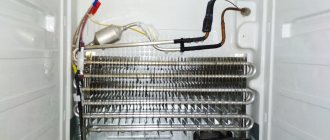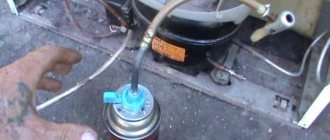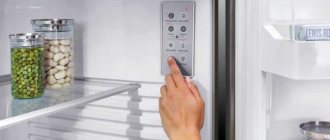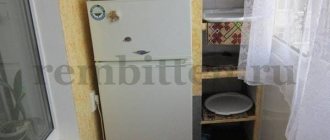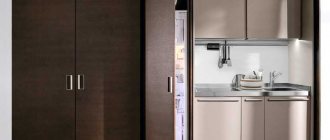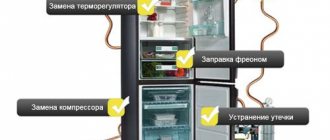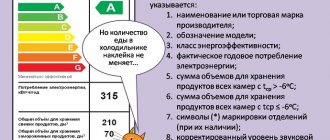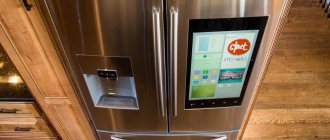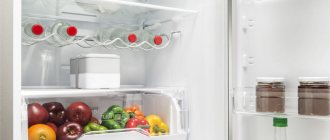The refrigerator is making knocking noises
Each device consists of many large and small parts, elements mounted on a frame or body. The system is dynamic, associated with the circulation of the refrigerant, a high-speed energy unit, the work of the cooler to cool the condenser and compressor, and the fan in the No Frost system. This is why the refrigerator knocks when operating.
Any sounds are amplified in the housing, like in a resonator. You can even hear the crackling of the expanding insulation between the walls. The compressor and fan motors are mounted on shock absorbers, but even they cannot dampen the noise. The manufacturer is obliged to fix everything that knocks loudly in the refrigerator, eliminate the sound amplification and meet sanitary standards - no more than 55 dB - the level of loud conversation. Most modern refrigerators operate with a noise level of no more than 40 dB - a quiet conversation.
Methods for diagnosing faults at home
Here are some tips on how to eliminate refrigerator noise with your own hands (if the nature of the problem allows you to do so).
First, check the condition of the food in the refrigerator and freezer compartments. If you are bothered by a strong grinding noise, and ice has appeared on the walls of the chambers (problems with the operation of the fans), try defrosting the refrigerator. This must be done within 12 hours, no less. If the problem was only ice, after switching on the equipment will become quieter.
Assess whether the refrigerator is level.
Another method is to see if there is any liquid under the electrical appliance. If this happens, start by checking that the outlet is working properly.
Why is the refrigerator knocking?
Each refrigerator mechanism produces characteristic sounds: the murmuring of refrigerant in the tubes, the rustling of fan blades, the sounds of switching from a relay, the noise of a running motor, the knocking of pistons.
There is technological noise, for example, the damper in the Bosch No Frost refrigerator knocks. The reasons for the knocking noise in the refrigerator may be related to defrosting. The fan blades touch the ice. Having heard an increased crackling noise or felt vibration, it is necessary to look for the cause and take action. Perhaps the cabinet is not level, the center of gravity has shifted, or the shelves are overloaded - all this can cause the refrigerator to operate noisily. You should be alert if the device starts knocking louder than usual.
The sounds of “crying” indicate that the refrigerator with the No Frost system has not been cleaned or defrosted for a long time. Ice may crack if there is a lot of ice accumulated in the chamber. The refrigerator whistles and hisses when the fan moves the air intensively. In the silence, you can hear the clicks of the thermostat relay, the pouring and gurgling of refrigerant in the pipes.
The user should be alerted if the refrigerator is knocking loudly and the sound occurs suddenly or increases over time.
Why do hydraulic compensators knock?
Hydraulic compensators regulate the thermal clearance of the valves and maintain it in proper condition when the engine is cold and warm. If noise appears, this does not indicate a faulty part. The reasons may be different:
- use of low-quality motor oil;
- malfunctions in the lubrication system of the power unit;
- mechanical wear of the main body.
The tapping occurs no matter how warm the unit is. This negatively affects the service life of the cylinder head, and other malfunctions may occur. When the hydraulic fluid is operating, contamination and defects appear on their surface, due to which the valve responsible for the oil intake hangs - the component simply stops working.
Air may enter the engine lubrication system due to lack of oil. Air has a negative impact on the level of oil compression, and it can appear in the system not only due to a lack of working fluid, but also due to its excess. Excess oil foams up in the oil pump, causing air to appear inside the system.
Let's look at specific situations and find out all the possible reasons for the knocking of hydraulic compensators.
Hot
Surely the problem is in the engine oil. It is the hydraulic fluid that primarily reacts to the presence of low-quality working fluid in the system. After changing the oil the knocking noise will disappear.
The problem may be that the oil filter is dirty, as a result of which dirt gets into the hydraulic compensator. If the engine oil is filled out of season, if the fluid viscosity does not meet the standards, this can also cause knocking. Deterioration in the properties of the lubricant occurs due to the ingress of antifreeze into it.
The source of the problem may be the oil pump. It must create the required pressure. If this does not happen, the oil stops flowing into the HA. The working fluid flows through the gaps between the sleeve and the plunger. I have to change the hydraulic compensator.
In the cold
The knocking sound of the engine can appear on a cold engine and disappear as the engine warms up. Then the most likely reason is a clogged oil channel. After warming up, the oil will become more liquid and the knocking will stop. But over time, the channels will definitely become completely clogged, and then the knocking will be continuous. Here you can use special additives - they will help clean the channels from accumulated contaminants.
The knocking of hydraulic compensators when cold is also due to a decrease in the throughput of the oil filter. Then knocking with varying intensity will be heard until the engine is completely warmed up.
Pay attention to the hydraulic compensator valve - if it does not hold oil, fluid will leak out when the engine is turned off
Thus, air enters the system, which is forced out after starting the engine - the knocking disappears. Wait 5-7 minutes. Sometimes it is useful to rev the idle speed - this will increase the pressure in the oil supply system. But it is harmful to gas for a long time. It is better to do this only when the warmed-up engine has been stopped for a while.
New
Another possible reason is incorrect installation of the mechanism. If the HA is placed incorrectly, it will not fill with oil.
Why is the refrigerator compressor knocking?
The compressor is the heart of the refrigerator. Its normal operation is accompanied by a low rumbling sound. A knock inevitably occurs at the moment of starting and stopping - the start-protection relay is activated. At the moment of starting, the load on the engine increases several times, so it hums louder until it accelerates. When turned off, a metallic knock is heard - the system calms down. A spring suspension and shock absorber are designed to dampen the noise and vibration of the compressor in the refrigerator.
The refrigerator motor may knock if it has reached the end of its service life, or the seats of the crank or piston system have worn out. The start relay may fail, and then the compressor will turn on for seconds, creating noise.
Refrigerator knocks when turned off
It happens that when the refrigerator is turned off, the compressor knocks loudly and bounces. This fact indicates a weakened shock absorber fastening. You need to move the refrigerator aside and look at the process when the unit stops. He should make an oscillatory movement and hit the body. The sound will be frighteningly loud. It is necessary to secure the motor and move it away from the body.
When the refrigerator is turned off, the knocking may intensify, accompanied by a sharp metallic clang, if the working refrigerant compression mechanism is faulty. In the future, the compressor may jam and the motor will burn out if the thermal protection does not work.
Refrigerator knocking during operation
All refrigerators make noise, but to varying degrees. This depends on the design, layout and material of the models. Some refrigerators are characterized by knocking on the doors, while others are characterized by loud compressor operation.
Users often complain about the Indesit refrigerator. Why does it knock, even when new? The device must be leveled horizontally with a slight tilt back. It is important to comply with the following conditions:
- the distance to walls and other furniture should be at least 5-7 cm;
- provide a stable voltage of 200-220 V;
- remove the transport bolts, tighten the fasteners until they stop, make soft gaskets between the tubes and the body.
The Indesit refrigerator will knock louder in the first days after starting work - the parts are grinding in and the system is getting cold. When installing trays, you need to ensure that the chambers are evenly filled.
Knocking noises from the Indesit refrigerator can be associated with the operation of the thermostat or the start of the relay. Process noise is an inevitable manifestation of device activity.
Ariston refrigerators belong to the same level of budget models, and they have the same problems with Indesit. Knocking, buzzing, and crackling noises are associated with the operation of the cooling system. As long as the noise is within acceptable limits, the refrigerator is working properly.
The Belarusian manufacturer of refrigerators Atlant produces models that occupy high places in the ratings. Thoughtful layout, good build quality, but there is a knock. Compressors with increased noise are used. The device reacts to icing or incorrect installation.
Korean Samsung and LG refrigerators of a higher class use inverter motors that operate continuously. The knocking noise is caused by the operation of No Frost, or by poor alignment when installing or loading cameras. These refrigerators are not much different in design. They have similar problems.
It happens that a Samsung refrigerator clicks, makes loud noises and buzzes. If the device knocks, the problems may be due to violation of operating requirements or a malfunction of any component. If there is any hum, vibration, or loud sound from the refrigerator, you need to check that it is installed correctly. The loud noise must be withstood for a week after switching on - the parts are grinding in and the cold is building up.
If the annoying rumble continues longer than expected, why is the refrigerator knocking, let the Samsung service department sort it out, the refrigerator is under warranty.
Why does the Refrigerator Knock While Working?
- No. 1 - improper installation or operation
No. 2 - loose compressor mount
- Failure #1 - incorrect fan operation
- Failure #2 - motor-compressor malfunction
Even if it visually seems that the device is installed correctly, checking will not hurt, because due to the uneven floor, one of the legs of the unit can only come into contact with the surface, or even just hang in the air. This causes the entire housing to vibrate when the engine is running.
Easily eliminated causes of noise
If a knocking sound is heard in equipment that has been working faithfully for more than one year, the most likely cause is a compressor failure.
But if we are talking about a new refrigerator, the problem may simply lie in the grinding in of new parts or improper operation of the unit. Therefore, before calling a repair specialist, make sure that you cannot get rid of the noise yourself.
No. 1 - improper installation or operation
The simplest and most common reason why a working refrigerator makes knocking noises and other uncharacteristic sounds is that the base is not level enough.
Even if it visually seems that the device is installed correctly, checking will not hurt, because due to the uneven floor, one of the legs of the unit can only come into contact with the surface, or even just hang in the air. This causes the entire housing to vibrate when the engine is running.
To check the evenness, you can use a horizontal building level by placing it on the “roof” of the unit. A simple plumb line made of strong thread and a small weight, such as a nut, will help you replace the tool.
Almost all modern refrigerators are equipped with height-adjustable threaded feet, with which you can correctly level the appliance
Another source of sound may be the compressor coming into contact with other metal parts when it is skewed. Tubes that are bent during transportation of the device can also make a knocking noise. In this case, you need to carefully bend the elements or place rubber pads to eliminate contact.
If the refrigerator has been running for a long time and suddenly starts making various noises, first check the temperature inside its chambers. The device freezes properly, and nothing force majeure has been detected other than unusual knocking and rattling?
Perhaps the reason for the increased noise lies in overloaded shelves or the arrangement of the products themselves - pots, jars and other hard containers may touch and knock against each other when starting or turning off the motor.
Try to completely empty the unit of any supplies placed inside it, including items on the roof of the housing. If the noise disappears, the issue is resolved.
The cause of strange sounds when the refrigerator is operating may also be unevenly installed or insufficiently firmly fixed shelves inside the unit - they also need to be checked for horizontal/verticality
But if, during inspection, other problems are discovered, for example, non-working backlight, snow deposits or an obvious “shortfall” in the temperature indicators, most likely it will be necessary to inspect and replace the failed parts.
No. 2 - loose compressor mount
If the refrigerator has just “moved” to your permanent residence, before turning it on, make sure that the shipping bolts or other fasteners that secure the compressor are removed.
However, not all models provide such protection, so it would be a good idea to look at the instructions and study the recommendations for starting the refrigerator for the first time.
Shipping bolts secure the compressor firmly to the housing so that shaking does not damage the pipeline or refrigerator housing.
If the situation is the opposite - the refrigerator has been working in a constant place for a long time and suddenly began to knock, perhaps the mounting fasteners holding the compressor have become loose, or the rubber gaskets have worn out.
This problem is not uncommon for older models that use springs, and if the compressor is skewed, when turned on/off, its casing will knock on the body, rocking the refrigerator. Repair measures here are simple - springs should be tightened or replaced, bolts should be tightened, gaskets should be updated.
To make sure that the source of the noise lies precisely in loose fastenings, just put your hand on the running motor, and if the knocking stops, try tightening the mounting screws
- Unscrew the mounting screws and remove the condenser - this is in case it interferes with the inspection of the compressor.
- Check the annular gap between the rubber bushing of the frame and the casing support - it should be uniform.
- If a discrepancy is detected, unscrew the screws securing the springs to the frame half a turn and adjust the degree of their tension to achieve the same clearance around the entire perimeter of the part.
- After this, you can turn on the device, check its position by gently shaking it, and if everything is in order, install the capacitor in its original place.
The knocking sound may appear due to an object stuck behind the condenser tubes located on the back wall of the unit, because many owners use the roof of the device as a convenient shelf for storing all kinds of small things.
Therefore, carefully inspect the elements, and if a foreign element is found, remove it, and at the same time check whether the tubes are in contact with the refrigerator body.
In addition to violating the installation technology of the heating system, the horizontal pipeline and riser are noisy for the following reasons:
What to do to reduce the volume of the murmur
If the new unit constantly gurgles and makes noise, the problem cannot be eliminated; isobutane is used as a refrigerant in the system. The devices are tested at the manufacturer for noise levels, this figure does not exceed 50 decibels.
- You hear the refrigerator purring especially loudly after closing the door. When the flap is open, the compressor automatically turns off and the movement of refrigerant stops. When the door is closed, the system turns on, freon begins to gurgle through the tubes.
- The refrigerator was turned off for a long time, and when plugged in it began to gurgle loudly. It will take time for the equipment to reach constant mode; the sound level decreases after a couple of days.
For a Bosch refrigerator, with electronic control, using new technologies for defrosting and cooling chambers, knocking during operation is divided into technological and emergency. The reasons may be improper operation or wear of parts.
Why does the engine knock in a new refrigerator?
And the last reason why a hard drive is knocking is the data reading head, or rather, its wear. It must be remembered that the more the disk works, the more the heads that read the information wear out. For example, for a user whose computer works only 10-12 hours a day, the hard drive will last much longer than if it worked 24/7 without interruptions. A long period of operation always reduces the service life of the hard drive, and nothing can be done about it.
Under constant loads, the read head wears out a lot, and as a result the hard drive knocks. How to fix this problem? Well, fortunately, everything here is not as sad as it might seem, because head wear is not always “fatal” for a railway. An old, worn head can always be replaced with a new, suitable one, and some do it themselves, without contacting service centers. There are plenty of instructions on specialized forums and websites on the Internet, so if you want to fix everything yourself, you just need to find a suitable manual and a new head for the disk.
If you don’t want to take risks or there is some uncertainty, fear of harm, etc., then the right option would be to go to a service center, where a technician will perform the replacement.
The refrigerator may make noise and hum incessantly due to wear on the compressor - the formation of backlash, abrasion of the pistons or piston rings. Not a single model is immune from such buzzing, including products from the popular Indesit brand. If the parts are severely worn, engine decompression occurs. In this case, in addition to extraneous sounds, there is an increase in engine operating time. The problem should be resolved by repairing or replacing the engine.
The refrigerator is not installed correctly
If the new refrigerator makes an indecently loud noise, it means that its vertical and horizontal position was not checked during installation. Therefore, the compressor moves and begins to touch the tubes or metal elements of the housing, producing grinding sounds. A more melodic sound is obtained when the body vibrates when one leg does not touch the floor.
To fix the problem, you need to use a spirit level to align the refrigerator vertically and horizontally. Instead of a spirit level, a simple thread with a weight will do. Then be sure to check again how the legs are positioned on the floor and, if necessary, adjust their position so that the refrigerator does not rock.
Having heard a crackling sound in the refrigerator, first check its performance : whether it continues to perform its functions, whether the freezer and refrigeration chambers are sufficiently cooled. If the device works quite well, then there is a possibility that the sound is a consequence of the contraction and expansion of materials. In this case, the plastic housing or evaporator tube cracks in refrigerators with an automatic cooling system. This does not apply to equipment malfunctions. The design of the device provides for slight deformation of the material. What else could be clicking in the refrigerator? A crackling sound when turning a normally functioning unit on and off is caused by the thermostat . Some models are equipped with a sonorous thermostat. It can be heard from the first day of operation of the equipment. If there was no sound, and suddenly it appeared, it’s worth finding out why this happened. The compressor mounts may have become loose. Then you shouldn’t delay repairs, so as not to cause engine failure.
Why does the Indesit, Atlant, Ariston, etc. refrigerator crack a lot?
Having heard a crackling sound in the refrigerator, first check its performance : whether it continues to perform its functions, whether the freezer and refrigeration chambers are sufficiently cooled. If the device works quite well, then there is a possibility that the sound is a consequence of the contraction and expansion of materials. In this case, the plastic housing or evaporator tube cracks in refrigerators with an automatic cooling system. This does not apply to equipment malfunctions. The design of the device provides for slight deformation of the material. What else could be clicking in the refrigerator? A crackling sound when turning a normally functioning unit on and off is caused by the thermostat . Some models are equipped with a sonorous thermostat. It can be heard from the first day of operation of the equipment. If there was no sound, and suddenly it appeared, it’s worth finding out why this happened. The compressor mounts may have become loose. Then you shouldn’t delay repairs, so as not to cause engine failure.
It happens that the device was working, then turned off and after a break does not turn on . You can hear the start relay clicking, but the engine does not start, and the refrigerator seems to be firing. The reason is insufficient voltage in the network. To ensure uninterrupted operation of the device, a stabilizer is installed.
Why does the refrigerator crackle? One of the reasons is uneven surface . To get rid of extraneous sounds, check the serviceability of the adjusting supports under the unit to see if they have sagged. Check to see if the device is in contact with nearby objects.
Interesting things on the site:
The refrigerator is leaking: how to identify the cause
Often, when there are air pockets, the pipes whistle, and the coolant in the system begins to make a characteristic murmur. Air can enter the heating circuit and pipes during repairs through leaky connecting elements. In addition to the constant babbling of water, there may be insufficient heating of the heating equipment to maintain the optimal temperature in the room.
Why does the engine knock in a new refrigerator?
And the last reason why a hard drive is knocking is the data reading head, or rather, its wear. It must be remembered that the more the disk works, the more the heads that read the information wear out. For example, for a user whose computer works only 10-12 hours a day, the hard drive will last much longer than if it worked 24/7 without interruptions. A long period of operation always reduces the service life of the hard drive, and nothing can be done about it.
Under constant loads, the read head wears out a lot, and as a result the hard drive knocks. How to fix this problem? Well, fortunately, everything here is not as sad as it might seem, because head wear is not always “fatal” for a railway. An old, worn head can always be replaced with a new, suitable one, and some do it themselves, without contacting service centers. There are plenty of instructions on specialized forums and websites on the Internet, so if you want to fix everything yourself, you just need to find a suitable manual and a new head for the disk.
If you don’t want to take risks or there is some uncertainty, fear of harm, etc., then the right option would be to go to a service center, where a technician will perform the replacement.
The humming sound is the most common warning sign of refrigerator problems. And here you must definitely keep in mind that the steps to find out the cause of the buzzing differ for new and old units.
How to determine if a refrigerator needs repair?
What to do if an Atlant or other compression refrigerator cracks? It is worth trying to determine the cause of the crackling noise. In economical types of refrigeration equipment, the inner lining is made of plastic, which begins to contract or expand as the temperature changes. This process is accompanied by a crash, since the size of the inner and outer lining changes. A cracking sound can be produced when the temperature of the insulating substance located between the chamber body and the plastic casing changes.
In not the best quality models, the gaps between different parts of the refrigerator are incorrectly adjusted. During operation, they can narrow, and therefore the parts of the equipment undergo friction with each other. Then the refrigerator cracks during operation. Sometimes overly zealous housewives, when washing the refrigerator compartment, press very hard on the surface, which causes the gaps to decrease.
In the described cases, the cracking goes away when the temperature equalizes. Why else might the camera make noise? Another reason for the cracking sound is a violation of the horizontal position when installing the refrigerator. If you check the horizontality of the floor in the kitchen and it turns out to be broken, you should take measures - place pieces of wood under one or two legs of the chamber to level out the horizontality.
A brand new refrigerator may crack a lot because the owner did not unscrew the shipping parts from the back before installing it. In the instructions for use there is a point about unscrewing unnecessary bolts.
The most harmless reason for the crackling sound is a mismatch in the position of the shelves with the grooves. In this case, it is enough to open the chamber and adjust the position of the shelves.
All these reasons are not a breakdown. But if you have taken measures and the cracking does not go away, you should contact a technician from the service center.
Unpleasant noise can also occur due to contamination of the injectors during operation. In addition to the hum, the gas pressure supplied to all four injectors drops. If the burner is difficult to ignite and the flame intensity is low, then you should try to clean the nozzle nozzles yourself, based on the detailed instructions. If the procedure is carried out correctly, the gas pressure will return to normal, and at the same time the buzzing will disappear.
If you hear noises, whistles or hums
These kinds of sounds are far from uncommon, especially in an apartment building. As a rule, in a single-family home you encounter this much less often.
The gurgling of water in the pipes, humming, knocking and extraneous noise in the heating system indicate a system malfunction or improper installation.
- There is a narrowing in the system that prevents water from circulating evenly through the pipes;
- There may be a communication leak;
- Or these sounds may be caused by using pipes with a smaller diameter than necessary.
First of all, it is necessary to check the communication for leaks. If your neighbors have no leaks, then the pipes are most likely noisy in the basement. It is there that the main components of the plumbing and heating systems are concentrated. If there is a leak, it can be detected by a rising stream of steam. In most cases, this is caused by the formation of fistulas in the communication wiring. They can form under a layer of thermal insulation, in valves. By the way, the leak is not always located in close proximity to the noise source. Indeed, in metal pipes the hum spreads over quite considerable distances. To fix the problem, you should not hesitate to call a plumbing team. If no leak was found, then it is quite possible that the reason lies in the deterioration of the permeability inside the pipe. You will need to listen to which areas there is noise. Most likely, these are the areas that will need to be replaced.
A slight noise in the pipes, a hum is heard, then this is not as critical a situation as when knocking occurs. If noise suddenly appears, you must immediately call a plumbing team.
Although it is possible that the deterioration in pipe capacity is caused by lime deposits. Then a reasonable solution would be to call a specialized team that can remove the scale and break through the system from the blockage.
Under the influence of various factors, noise can appear not only in batteries, but also in heating pipes. At the same time, both metal and metal-plastic pipes can sound equally unpleasant.
Why is the refrigerator knocking: identifying the causes and eliminating it
During operation, the refrigerator always makes sounds, since the device consists of complex mechanical components. But sometimes new sounds are added to the usual ones - clicking and crackling. Some owners begin to worry about the condition of the equipment, because increased noise can not only cause discomfort, but also cause breakdowns. To understand the situation, you need to study possible factors that can affect the appearance of crackling.
If clicking sounds are heard while the compressor is resting, the sounds most likely arise from the deformation of materials during cooling and heating.
Timely prevention of all components of boiler equipment can minimize the likelihood of noise.
Damage to the motor-compressor suspension
If increased noise is accompanied by periodic rocking of the refrigerator when it is turned on or off, this indicates a change in the position of the compressor. Basically, in such situations, the motor-compressor casing sags on the external suspensions, and the compressor rests on the frame. Basically, the suspension becomes loose during transportation of the refrigerator. You can avoid its displacement if you carefully tighten the transport bolts before transportation. If they are missing, the compressor must be secured with a rope or wire so that it does not move. In order to eliminate this malfunction, you must dismantle the capacitor and check the annular gap located between the rubber bushing of the frame bracket socket and the casing support. By adjusting the degree of tension of the suspension springs, you can achieve a uniform gap around the entire circumference of the part. After this, you should turn on the unit and check how it works and only then fix the capacitor in its original place. If a knocking noise occurs when starting or stopping the refrigerator, the cause of this phenomenon may be a swinging compressor casing. To eliminate this type of malfunction, it is necessary to adjust the bolts on the springs (loosen them or tighten them stronger) or place shims under the supports. Repairing the internal suspension of a motor-compressor is problematic. To fix the problem, it is advisable to use the services of professionals.
To avoid problems with refrigeration equipment, noise and knocking, follow the operating instructions.
Why are knocks and noises at night?
Having determined the cause, we will try to eliminate it ourselves. If the knocking still continues, contact the service center for serious diagnostics.
There is only one question left: why do sounds appear at night? There is also an explanation for this, and a very simple one. In fact, extraneous noise occurs constantly, both day and night. But during the day they dissolve in other everyday sounds, music, conversation, etc. But at night, when most of the usual noises subside, we can clearly hear that the refrigerator is knocking, creaking, and reminding us of itself.
The causes of noise can be different: the device is close to furniture or a wall, or it is affected by nearby objects, breakdown, or ice. For some reasons, the owner can fix it himself, for others they call a technician, and in some cases it is not possible to repair the unit, and it is replaced with a new one.
Why do refrigerators rattle and hum?
The refrigerator takes pride of place in the kitchen and performs many functions: freezing, cooling, keeping food fresh.
Over time, housewives notice that the device begins to buzz loudly. Why does the refrigerator rattle and whistle? Noise is possible both due to improper installation and due to breakdown. The main source of noise is the compressor. It brings on the cold and makes rattling and humming noises. If the unit has two compressors, it makes twice as much noise.
Content
The refrigerator is not a silent device. The equipment is constantly noisy due to its powerful engine. However, sometimes it happens that extraneous sounds are heard that were not there before. Most often, owners observe clicking sounds. In most cases, experts do not consider them problems. But it’s better to find out why the refrigerator is cracking in order to take the necessary measures.
Having heard a crackling sound in the refrigerator, first check its performance : whether it continues to perform its functions, whether the freezer and refrigeration chambers are sufficiently cooled. If the device works quite well, then there is a possibility that the sound is a consequence of the contraction and expansion of materials. In this case, the plastic housing or evaporator tube cracks in refrigerators with an automatic cooling system. This does not apply to equipment malfunctions. The design of the device provides for slight deformation of the material. What else could be clicking in the refrigerator? A crackling sound when turning a normally functioning unit on and off is caused by the thermostat . Some models are equipped with a sonorous thermostat. It can be heard from the first day of operation of the equipment. If there was no sound, and suddenly it appeared, it’s worth finding out why this happened. The compressor mounts may have become loose. Then you shouldn’t delay repairs, so as not to cause engine failure.
It happens that the device was working, then turned off and after a break does not turn on . You can hear the start relay clicking, but the engine does not start, and the refrigerator seems to be firing. The reason is insufficient voltage in the network. To ensure uninterrupted operation of the device, a stabilizer is installed.
Why does the refrigerator crackle? One of the reasons is uneven surface . To get rid of extraneous sounds, check the serviceability of the adjusting supports under the unit to see if they have sagged. Check to see if the device is in contact with nearby objects.
Interesting things on the site:
The refrigerator is leaking: how to identify the cause
View » Why you can’t put hot food and pots in the refrigerator: to what temperature should you cool it?
Clogged throttle capillary tube
The capillary tube is an element of the system through which freon circulates. It may become clogged due to a breakdown of the filter-drier, which has ceased to retain mechanical impurities. The noise of refrigerators after replacing compressors can also be associated with a violation of the patency of the throttle tube. This happens if the technician neglected to clean the cooling system.
Another cause of blockage is poor quality repair of the cooling circuit. Freon can mix with the engine lubricant, and since the diameter of the tube is no more than 2 mm, any foreign particles will inevitably cause it to clog.
Unusual sounds can occur when operating not only old, but also new equipment. Having figured out why the refrigerator growls, you can take the necessary measures in a timely manner or contact a qualified technician. Delay threatens the final failure of the device and additional costs.
Why does a Bosch refrigerator knock?
Complex household appliances from German brands are considered reliable and are the standard of quality. However, even the best equipment wears out over the years, the metal ages, seats wear out, and backlash appears. Therefore, any refrigerator will start knocking when turned on and during operation.
For a Bosch refrigerator, with electronic control, using new technologies for defrosting and cooling chambers, knocking during operation is divided into technological and emergency. The reasons may be improper operation or wear of parts. For example, if after closing the door of a Bosch refrigerator you can hear knocking inside for some time, you need to pay attention to how the defrosting system works and why the fan blades touch the ice.
The Bosch refrigerator knocks irritatingly and makes other sounds when it breaks down:
- There can be 3 fans in the device, and each has plain bearings. Over the years, the seat wears out and additional noise appears. The knocking occurs when the door opens and closes, because at this time the temperature in the chamber rises and the compressor starts.
- The motor-compressor is faulty. It is necessary to find out which unit needs repair. Perhaps only the bearings need lubrication. A complete replacement of the unit is not excluded.
There is no reason to worry if the Bosch refrigerator knocks quietly, the sound does not increase, the operating mode is not disrupted, and the alarm signal does not light up. The clicking sound can occur from thermal expansion of housing parts and thermal insulation, or from the operation of the thermostat.
But if new knocks, creaks, clicks, or vibrations occur that are not typical for a Bosch refrigerator, you need to contact a repair shop.
Reasons for loud knocking in the refrigerator
If you have not previously noticed any extraneous sounds when the equipment is operating, you need to sound the alarm. Perhaps these are the first signs of a breakdown.
Pay attention to signs of malfunction:
- When turning on and off a refrigerator with electromechanical control, a knocking or cracking sound is heard. As we wrote above, the reason may be the thermistor, which is responsible for controlling the temperature in the chamber. It could have knocked before, but if the compressor does not start, the sound can be heard clearly. It is necessary to carry out diagnostics and, if necessary, replace the thermostat.
- In addition to the knocking noise, have you noticed that the refrigerator is not working well? The lights in the compartment may be off or there is no frost in the freezer. Signs indicate problems with the motor-compressor. As soon as the engine starts, the starting relay immediately turns it off. A click is heard. The damage is serious, so it is better to call a specialist for repairs.
- A reverse breakdown could occur - the start-up relay does not work. The compressor tries to start, but nothing happens. Knocks and clicks are heard. Opening the refrigerator door, you notice that there is no light in the compartment. A new relay needs to be installed as it cannot be repaired.
- Problems with motor mounting. When the compressor is in operation, it vibrates. If the fasteners are loose or loose, the appliance may come into contact with the refrigerator body. As a result, a characteristic knock appears.
All malfunctions require immediate repair and intervention by a specialist.
What else you need to check:
- If an extraneous sound appears, check whether the shelves and partitions are located correctly in the chamber.
- Are jars, pans or other utensils touching each other, which could cause knocking during operation?
- Is the refrigerator level? When installing, a slight deviation back is allowed. If the equipment is positioned incorrectly, the legs need to be adjusted.
How to prevent breakdown
To avoid problems with refrigeration equipment, noise and knocking, follow the operating instructions.
- Do not overload the camera shelves with products.
- Do not clutter the top of the refrigerator with foreign objects.
- Do not keep the door open for long. If you have a drip defrost system, make sure that the refrigerator defrosts on time.
Watch the video on the topic:
By following the manufacturer's instructions, you can successfully use the equipment for many years.
Speakers make noise when turning off refrigerator
Most refrigerators operate in discrete mode - the motor turns on periodically. In apartment wiring, two sockets are often connected on either side of the wall from one network line.
Changes in current parameters when the refrigerator stops in the kitchen are reflected in the operation of electronic equipment in the room. The interference occurs from sparking relay contacts if a connection is noticed between turning off the refrigerator and a knocking sound in the speakers. This is caused by a sharp drop in voltage in the network. The sparking relay only enhances the effect.
The solution is to purchase a filter and switch to another outlet. The relay contacts need to be cleaned, but the voltage drop will remain when the compressor stops.

